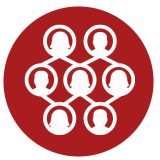This action was guided by the need to reinforce the formalization of gender equality actions within the organisation. External networks would reinforce the importance of actions because, for example, as part of the network agreement within iGEN network, each institution needs to evaluate and report annually on its actions.
Creating a network structure with the aim to facilitate and maintain communication and cooperation between actors in the areas of gender research and gender equality practice
Problem (evidence)
Aims/objectives
To facilitate and boost communication and cooperation between actors in the areas of gender research and gender equality practice in different levels and fields. This would also improve the impact, the quality and the sustainability of the actions and support the implementation of the Gender Equality Plan and the Gender Equality, Diversity and Inclusion Commission activity.
Resources
Time required to engage and participate in those networking activities. Committed individuals in establishing and maintaining these contacts.
Brief outcomes
Access to gender training, expertise and information through these networks
Being part of these networks enabled a better understanding of the gender situation in our unit since we had access to training and shared resources where we could compare our organisational situation in terms of gender compared to other organisations.
Communication and collaboration on gender equality, sharing and learning from each other in the network about good practices and impact.
Key area
The governance bodies, key actors and decision-makers
Type of action
Creation of structures
Organization
Lisbon School of Economics and Management (ISEG)
Higher education institution
Action level of implementation
Researchers/professors and technical and administrative staff
Implementation
Networking actions, with different degrees of formalization, were developed at different levels in relation to gender equality research and practice (sister projects, ministerial departments, gender equality governmental departments, gender equality and citizenship associations, think tanks organizations, faculties from University of Lisbon, student unions and organization, embassies, international organizations branches (e.g. ILO), business sector and business associations, research departments).
Under the PLOTINA ISEG team proposal, the RPO pursued and became formally part of two relevant networks with particular significance for gender research and gender equality practices: the iGEN and the SAGE (Systemic Action for Gender Equality. SAGE Charter of Principles for Gender Equality). The institution signed its commitment to both networks in 2018 and 2019. It also signed in 2019 a protocol between the institution and the CIG Commission for Citizenship and Gender Equality Presidency of the Council of Ministers [Comissão para a Cidadania e Igualdade de Género Presidencia do Conselho de Ministros].
The more important action is the participation of the RPO in the iGEN network, proposed by the PLOTINA team, which made contact with them and ensured institutional commitment to sign the network agreement.
iGEN: This is a network of 80 firms and institutions for gender equality. There are 5 taskforces devoted to the following themes: recruitment and selection, appraisal and career development; work and personal life integration; pay, job evaluation and gender bias; communication and language; support for design of equality plans and monitoring; and training and education (ISEG is member of the latter). Through iGEN, there is an exchange of information and practice on gender equality through a programme of regular meetings about specific topics (plenary or task forces;, e.g. Masculinities and Care; implementing and evaluating GEPs; Labour legislation and gender equality, etc.). There are also opportunities to attend relevant training regarding gender equality (Gender Lab). All members have to select 4–5 gender equality actions that they will have to design and implement. After a year, an audit is undertaken by IGEN (annual report available in English (example here) and Portuguese). Each year, all members have to select different 4–5 gender equality actions.
SAGE Charter of Principles for Gender Equality (here) created a network of about 10 Portuguese RPOs and many other RPOs in other European countries.
Challenges
Due to bureaucratic administrative processes and rules, engagement and formal involvement with external networks (for example signing a common agreement) took substantial time and effort.
Commitment of individuals and lack of workload recognition.
Logistics of external network events conflict with academic and teaching duties.
Coping strategies
Capitalise on personal/institutional contacts and available opportunities for networking.
Identify and communicate synergies and mutual benefits between connecting organisations of the networks to ensure mutual support, engagement and sustainable collaboration.
Tips/strategies – Lessons learnt
Identify and communicate common interests and mutual benefits of collaborating with external entities or networks to ensure formal commitment of the institution with the external networks before formally agreeing to the network.
More detailed Outcomes/Impact
Continued access to seminars, trainings, expertise and sharing good practices across different institutions.
Continuous implementation of gender equality actions beyond PLOTINA project by linking such actions with other networks and their processes.
Reflection: what we would do differently
More individuals from the institution should be involved and should be formally assigned to be committed to those networks to ensure engagement and continuity which will allow building long term trusted relationships. Individuals should also be recognised for the time invested in these activities (either through workload or promotion/career progression).
Unintended consequences
By linking to different external networks, the institution also got institutional prestige since major corporate organisations are part of this group and networking contacts facilitate collaboration between university and industry beyond gender equality mission.


